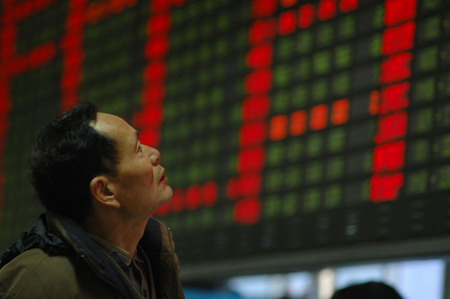Top Biz News
Equities slide as govt applies brakes
(China Daily/Agencies)
Updated: 2010-01-08 08:06
 |
Large Medium Small |
|
 |
|
Chinese stocks fell on expectations of government moves to limit lending and curb surging property prices. [China Daily] |
China's stocks fell the most in two weeks, led by banks and automakers, on concern government steps to curb lending growth and property speculation will slow expansion in the world's third-largest economy.
SAIC Motor Co, the country's biggest carmaker, plunged 4.4 percent on prospects auto sales will slow this year after the government withdrew some stimulus. Industrial and Commercial Bank of China Ltd (ICBC), the nation's largest listed lender, and China CITIC Bank Corp dropped more than 2 percent as an increase in rates on three-month bills for the first time in 19 weeks signaled tighter liquidity.
"Growth will probably slow this year as tight credit will dampen the demand side," said Zhang Ling, who helps oversee about $7.21 billion at ICBC Credit Suisse Asset Management Co in Beijing. "That will dash investors' hope of another year of fast growth."
The Shanghai Composite Index slid 61 points, or 1.9 percent, to 3,192.77 at the close, the biggest decline since Dec 22. The gauge has lost 2.6 percent in the first four days of trading this year, after rallying 80 percent in 2009. The CSI 300 Index, measuring exchanges in Shanghai and Shenzhen, retreated 2 percent to 3,471.46.
ICBC lost 2.4 percent to 5.21 yuan ($76 cents). CITIC Bank slid 3.4 percent to 7.67 yuan. China Minsheng Banking Corp, the nation's first privately owned bank, slipped 2.7 percent to 7.70 yuan.
The People's Bank of China offered 60 billion yuan of bills at a yield of 1.3684 percent. Policymakers will seek "moderate" loan growth to support the economy while managing inflation expectations, the bank said yesterday in a report on its annual work meeting.
'Tightening liquidity'
"It's definitely a signal that the central bank is tightening liquidity," said Jiang Chao, a fixed-income analyst in Shanghai at Guotai Junan Securities Co, the nation's largest brokerage by revenue. "The rising yield is used to prevent excessive growth in bank lending."
China may have about 7.5 trillion yuan of new bank lending this year, the China Securities Journal reported, citing an unidentified person. Banks extended a record 9.21 trillion yuan of new loans in the first 11 months of 2009.
SAIC slid 4.4 percent to 24.12 yuan. The stock jumped 388 percent last year as tax cuts helped sales surge. The automaker has forecast a rise of less than 15 percent in industry-wide sales this year, compared with a 42 percent gain in the first 11 months of last year, as the government increased taxes.
FAW Car Co, which makes passenger cars in China with Volkswagen AG, retreated 4.1 percent to 22.94 yuan, the biggest drop since Nov 27. Chongqing Changan Automobile Co, the Chinese partner of Ford Motor Co and Mazda Motor Corp, slid 4.9 percent to 13.50 yuan.
Slowing car sales
"I don't think last year's explosive growth will be sustained this year," said Zhang at ICBC Credit Suisse Asset Management. "Car sales will slow down."
The crackdown on property prices also poses risks for the economy after the government tightened tax and mortgage rules for second-home purchases.
China needs to sustain an "unprecedented" building boom in the first half of this year because export growth is limited and consumer spending is not yet sufficient to be the main driver in the economy, said Mark Williams, an economist at the Capital Economics Ltd in London.
Premier Wen Jiabao said on Dec 27 that last year's doubling in new loans had caused property prices to rise "too quickly".
Liu Mingkang, the top banking regulator, wrote in an opinion piece in Bloomberg News this week that "structural bubbles threaten to emerge" in the world's fastest-growing economy.









